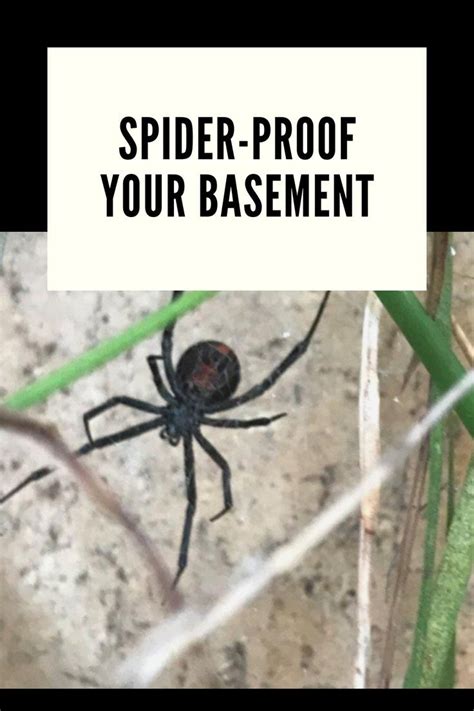Your Step-by-Step Guide to a Spider-Free Basement
A spider-infested basement is nobody's dream. These eight-legged creatures can be unsettling, and some species even pose a slight health risk. But fear not! Eliminating spiders from your basement doesn't require calling in an exterminator immediately. This comprehensive guide provides a step-by-step approach to creating a spider-free haven, focusing on prevention and control methods you can implement yourself.
Understanding Why Spiders Invade Basements
Before diving into solutions, let's understand why spiders choose basements as their homes. Basements typically offer:
- Dark, Damp Conditions: Many spiders thrive in cool, moist environments.
- Abundant Prey: Basements often harbor insects like flies, moths, and other arthropods, providing a ready food source for spiders.
- Shelter and Protection: The secluded nature of basements offers spiders protection from predators and harsh weather conditions.
Addressing these factors is crucial to successfully keeping spiders at bay.
Step 1: Thorough Cleaning and Decluttering
This is the cornerstone of spider control. Spiders love clutter – it provides hiding places and easy access to prey.
- Remove all unnecessary items: Old boxes, discarded furniture, and stacks of newspapers are spider havens. Donate, recycle, or properly dispose of these items.
- Vacuum and sweep meticulously: Pay close attention to corners, crevices, and under furniture. Use a vacuum with a hose attachment to reach tight spaces.
- Wipe down surfaces: Dust and cobwebs attract insects, which in turn attract spiders. Wipe down shelves, walls, and window sills with a damp cloth.
Step 2: Sealing Entry Points
Spiders are surprisingly adept at squeezing through tiny openings. Sealing these entry points is vital to prevent new infestations.
- Inspect the foundation: Look for cracks and gaps in the walls, around pipes, and near windows and doors.
- Caulk or seal all openings: Use caulk specifically designed for exterior use to fill gaps and cracks effectively. Consider weatherstripping around doors and windows for a tighter seal.
- Repair damaged screens: Ensure all windows and vents are properly screened to prevent spider entry.
Step 3: Eliminating Food Sources (Insects)
Spiders won't stick around if their food supply disappears.
- Control insects: Address any pest infestations, such as ants, flies, or moths, using appropriate pest control measures. This will drastically reduce the spiders' attraction to your basement.
- Store food properly: Keep all food items sealed in airtight containers to prevent attracting insects.
- Maintain cleanliness: Regular cleaning prevents the buildup of food crumbs and spills that attract insects.
Step 4: Employing Natural Repellents
Several natural substances deter spiders.
- Essential Oils: Peppermint, tea tree, and eucalyptus oils are known spider repellents. Dilute a few drops in water and spray around the perimeter of your basement.
- Vinegar: The strong scent of vinegar can deter spiders. Mix equal parts water and vinegar and spray in areas where you've seen spiders.
- Citrus Fruits: Spiders dislike the scent of citrus. Place citrus peels around the basement to deter them.
Step 5: Regular Maintenance
Prevention is key. Regular maintenance will keep spiders at bay.
- Regular cleaning: Vacuum and clean your basement regularly, especially in corners and crevices.
- Inspect for new cracks or openings: Regularly check for and seal any new cracks or openings that spiders might exploit.
- Monitor insect activity: Keep an eye out for insects and address any infestations promptly.
What Attracts Spiders to My Basement?
Spiders are attracted to basements primarily because they provide ideal living conditions: darkness, moisture, and an abundance of insects (their food source). Clutter also provides ample hiding places and shelter.
How Often Should I Clean My Basement to Prevent Spiders?
Ideally, you should clean your basement at least monthly, focusing on vacuuming, wiping down surfaces, and checking for any new cracks or openings. More frequent cleaning is recommended if you have a significant insect problem.
Are There Any Specific Types of Spiders That Favor Basements?
While many spider species can inhabit basements, cellar spiders (long-legged spiders often found in webs in corners) are particularly common. However, it's crucial to identify any spiders you encounter to ensure they are not dangerous.
Conclusion
A spider-free basement is achievable with consistent effort. By implementing these steps – cleaning, sealing entry points, eliminating insect prey, using natural repellents, and maintaining regular cleanliness – you can create a comfortable and spider-free space in your home. Remember, prevention is always better than cure!

